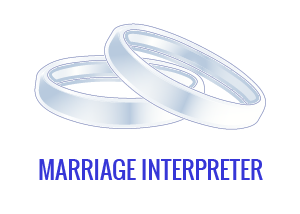
The Marriage Notification Process in Ireland
If the bride or groom, either witness or the solemniser does not understand the language of the ceremony, the couple must arrange for an interpreter to be present.
According to the Civil Registration Act 2012, the services of an interpreter must be obtained where any of the parties to the marriage, the witnesses or the solemniser does not have sufficient knowledge of the language of the ceremony to understand it. It is the responsibility of the couple to arrange this service.
Use of interpreters
Are you in a rush and need a language interpreter right now for your wedding notification or marriage ceremony? Contact Galway Certified Translations today to get a quote for this.
We cover most cities and towns of the West of Ireland such as Galway, Limerick, Mayo, Clare, and even North West – Sligo, Donegal, etc.
After 5th November 2007 any couple proposing to marry should begin the process by contacting their local Registration Office to make an appointment to meet the Registrar to give him/her their marriage notification. Notifications can be taken only by prior appointment with the Registrar. While only three months’ notice is required by law, couples are advised to contact the Registrar well over three months before their intended date of marriage to ensure they can get a timely appointment. The notification details will be entered on a computerised notification system by the Registrar on the basis of the information given by the couple. When attending the Registrar’s office in relation to the notification, the couple must also pay the notification fee of €200 and provide the Registrar with evidence of their name, address, age, civil status and nationality.
In general, all couples will be asked to produce:
- Passport (must be in date)
- Birth Certificate (must bear an Apostille stamp if not issued by the Irish Civil Registration Authorities)
- If either party is divorced, original final decrees in respect of all previous divorces
- If either party has a civil partnership dissolution – original dissolutions in respect of all previous civil partnerships
- If widowed, death certificate of the previous spouse and the civil marriage certificate for their first marriage
- If a surviving civil partner – the death certificate(s) of the previous civil partner(s) and the civil partnership registration certificate(s)
- If party to a civil partnership or marriage that was annulled by an Irish Court – the final decree of nullity and a letter from the relevant court confirming that no appeal was lodged
- Their PPS Numbers (where either or both of the parties have one)
- Fee of €200 as above
Additional documentation may be required in some cases, such as where a divorce has been granted outside the State and it must be determined whether it is recognised under Irish law. The Registrar will advise what is required in each case.
Please note that the above list is not exhaustive. All couples should check directly with the registrar, before their appointment, to ensure that they have all the required documentation.
In addition to their personal particulars, the couple will be requested to provide details in relation to their proposed marriage such as
- the intended date of marriage
- whether they require a civil, religious or secular ceremony
- the names and dates of birth of their witnesses
- details of the proposed solemniser and venue.
They will also both have to complete a declaration of no impediment stating that they are not aware of any lawful impediment to the proposed marriage.